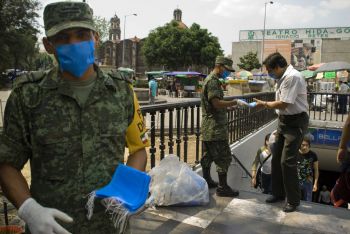Rethink how we prepare for flu pandemics, say scientists
Posted on behalf of: STEPS Centre
Last updated: Monday, 28 January 2013

Soldiers hand out masks near a shopping mall in Mexico City after the emergence of H1N1 in April 2009. Photo Militares y Cubrebocas by eneas on Flickr (creative commons).
That a new pandemic will arrive, sooner or later, is probably the only thing about pandemic influenza upon which scientists agree. With current research and past approaches to pandemic threats proving highly controversial with both the public and scientific community, researchers at the University of Sussex have been examining new pathways to preparedness, with a new paper published today (Monday 28 January) and a high-level workshop earlier this month.
These latest discussions build on years of research at the University’s Centre for Global Health Policy (CGHP) and the STEPS Centre, which is based at SPRU - Science and Technology Policy Research and the Institute of Development Studies on campus. Researchers have been trying to develop a better understanding of why controversies have emerged around pandemic flu, in order to inform future approaches.
In his new STEPS Centre Working Paper, To Pandemic or Not? Reconfiguring Global Responses to Influenza, Paul Forster examines the political economy of knowledge in responses to the H1N1 (swine flu) pandemic in 2009-10.
Forster argues that the world would be better protected by a re-ordering of pandemic preparedness and response efforts around the needs of the world’s poorest, most vulnerable, and most exposed people. This would allow the examination of the undue pre-eminence of drugs, scrutiny of contemporary agricultural practices and focus on the pressing need for disease surveillance in animals.
A workshop hosted by CGHP and the STEPS Centre on 10 and 11 January explored in depth the multiple facets of these pandemic flu controversies with more than 50 international experts from the worlds of science, policy, the media and academic publishing – with both social and natural science expertise.
Professor Stefan Elbe, Director of CGHP, said: “One of the main lessons learned was that preparing for flu is simply not just about flu; it is just as much – if not more so – about the interventions that we need to implement in order to manage a pandemic.
“North-South politics and global-local politics loom large, as responses geared to international health and economic interests often conflict with priorities of people in local settings.”
“We also explored how controversies are great opportunities to unearth the contested, contingent, and fractious nature of knowledge that shapes our ongoing quest to protect human lives. Social science perspectives are therefore a critical complement to natural science-based understandings.
“Importantly, how some of these controversies could also be diminished and perhaps even avoided in future were revealed.
“As the world prepares for the inevitable next pandemic, new ways of working and new organizational mechanisms for assuring global health – combining natural and social science approaches - are needed.”
The paper, as well as a host of other briefings, projects, articles, papers, blogs and multimedia resources about pandemic flu, is available on the STEPS Centre website.

